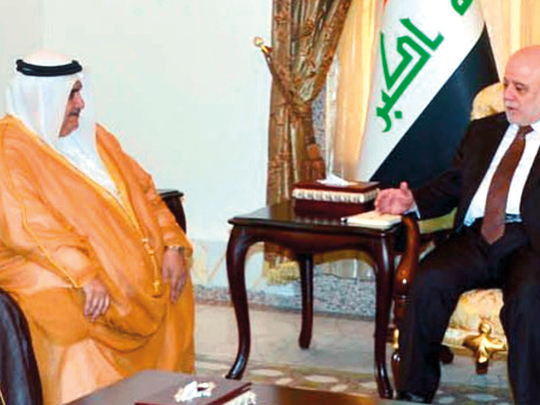
Dubai: Moqtada Al Sadr, a prominent Iraqi Shiite cleric and political leader, is emerging as a key player in efforts by Saudi Arabia and other Gulf states to weaken the influence of regional rival Iran.
The UAE flew in Al Sadr for talks with Abu Dhabi Crown Prince Mohammad Bin Zayed Al Nahyan late Sunday. That followed a meeting with Saudi Crown Prince Mohammad Bin Salman in Riyadh last month, another rare face-to-face visit with a senior Gulf official.
“Our ambition is to see an Arab, stable and prosperous Iraq,” UAE Minister of State for Foreign Affairs Anwar Gargash said on Twitter Monday.
“The promising move toward Iraq led by Prince Mohammad Bin Salman with the participation of the UAE and Bahrain is an example of the influence of Gulf states with a united vision and objectives,” he said.
“Experience has taught us to always call for what binds us as Arabs and Muslims and reject advocates of division,” Shaikh Mohammad, said.
“Muqtada Al Sadr is a moderate man, and a statesman,” Saudi political scientist Waheed Hamza Hashem told Gulf News.
“He realises that sectarianism is negatively affecting the future of the Iraqi people and the future of all Arabs, because it spreads hatred, sedition, chaos and conflict.”
Iraqi-Gulf rapprochement, and the visits leading Iraqi politicians is “a positive development”, said Mohammad Saeed Naji, from Al Ahram Strategic Studies Centre.
The increasing interest from the Arab side to re-establish a strong relations with Iraq coincides with “a growing trend inside Iraq in forming political parties and blocs that reject sectarianism, and try to rebel against attempts to enforce the sectarianism in Iraq politics,” he told Gulf News.
Al Sadr’s office confirmed the visits to the Gulf and said Riyadh was considering opening a consulate in Al Sadr’s base in Najaf, and establishing air and land links between Najaf and Saudi Arabia.
The outreach to Al Sadr is part of a broader Saudi-led effort to roll back Iran’s expanding sway in the region, including in Iraq, where Shiite parties have dominated politics since the US toppled the secular, Sunni-dominated regime of Saddam Hussain in 2003.
As Iran’s reach in Iraq, Lebanon, Yemen and other countries has grown, the regional heavyweights have found themselves on opposing sides of sectarian conflicts.
Saudi Arabia and the UAE are attempting to return “Iraq to its Arab cultural, historical and ethnic” identity, said Mohammad Al Sulami, head of the Riyadh-based Arabian Gulf Centre for Iranian Studies.
There’s a debate about the need to “strengthen the Arab Shiite authority in Najaf and Karbala after years of systematic marginalisation by Iran,” said Al Sulami, referring to two important Shiite centres in Iraq.
Gulf states want to “thwart schemes that deliberately exploit religious sects to achieve political aims and expansionary ambitions,” he added.
Al Sadr, who commands a large following among Iraq’s urban poor and is critical of Prime Minister Haider Al Abadi’s government, has denounced Iran’s influence in his country.
He’s called for the dissolution of the state-sponsored Hashd Al Shaabi, a coalition of militias dominated by Iranian-backed Shiite fighters, which strengthened their hand in Iraq after its army collapsed confronting a Daesh onslaught.
Gulf states “are trying to fend off Iran’s influence in the region and empower Arab Shiite forces because it’s a totally self-defeating strategy to ignore countries under Iranian influence, whether it is in Lebanon or Iraq,” said Sami Nader, head of the Beirut-based Levant Institute for Strategic Affairs.
-with inputs from Bloomberg












